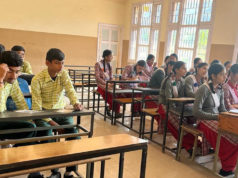In India, NEET and JEE are widely regarded as the most prestigious and challenging examinations. However, clearing the cut-off for these exams is not as simple as it may seem. With intense competition among students, coaching institutes have emerged as prominent players in preparing students for these exams, boasting about their extraordinary faculty, often hailing from IITs. Consequently, these coaching institutes have sprung up in every nook and corner of cities, big and small, across the nation.
As the number of coaching institutes has multiplied, the availability of students has become a major issue, leading to the emergence of the concept of “dummy admission” in the education system. In this practice, students take admission in schools but primarily study at coaching institutes. These “dummy schools” have tie-ups with regular schools, where students attend coaching classes and their attendance is marked at the affiliated school. This trend is most prevalent among science students aspiring to clear the JEE and NEET exams.
However, this begs the question: are regular schools capable of providing adequate education? Are the teachers at these schools, affiliated with CBSE or state boards, qualified enough to teach? If they are, then why is there a need for these dummy classes? And if not, how are these schools granted affiliation by the education boards?
The implications of dummy admission are profound and can have serious consequences for both the education system and the students themselves. Firstly, it compromises the integrity of the education system by diluting the quality of education provided. Essentially, it amounts to a form of cheating that lowers the standards and devalues the credentials of those who have earned them legitimately.
Furthermore, dummy admission creates a false sense of achievement for students who lack the skills required for a particular academic program. They may initially feel successful in gaining admission to a prestigious program, but eventually struggle to keep up with the coursework. This can result in frustration, anxiety, and a lack of confidence in their abilities.
Moreover, dummy admission can have long-term ramifications for the careers of these students. Without the necessary skills and knowledge to excel in their field, they may face challenges in securing employment or advancing in their careers. This can ultimately have a negative impact on the economy as well.
The repercussions of dummy admission are not limited to the students who are admitted. It also affects deserving candidates who are denied admission due to limited slots being occupied by unqualified students. This denies deserving candidates the opportunity to pursue their education and achieve their goals.
Private coaching institutes often capitalize on students’ fear of failure and success, promoting the concept of dummy schools or classes. To address the issue of dummy admission, educational institutions must implement stringent admission criteria based on merit and competence. This will ensure that only qualified students are admitted into academic programs, elevating the standards and reputation of the institutions.
Additionally, educational institutions must actively monitor the progress of students and identify those who are struggling to keep up with the coursework. Early intervention and support can help these students catch up and succeed in their academic pursuits.
The concept of dummy admission poses a serious threat to the education system and the learning outcomes of students. It is imperative that educational institutions take proactive measures to prevent this practice and ensure that only qualified students are admitted into academic programs. By doing so, they can uphold the integrity of the education system and ensure that students are adequately prepared for their future careers.






